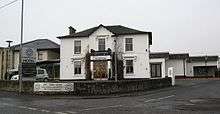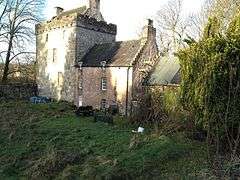Castlecary
- This article is about the village near Cumbernauld in Scotland. For the village in Somerset, see Castle Cary. For the actual castle see Castle Cary Castle.
Coordinates: 55°58′44″N 3°56′56″W / 55.979°N 3.949°W

Castlecary is a small village in North Lanarkshire, Scotland close to the border with the Falkirk council area. It is close to the new town of Cumbernauld.
Castlecary is like many other settlements in the area tied to the Roman history of Scotland. The route of the Antonine Wall passes close to the village. A Roman camp existed at Castlecary, first constructed around the year 80 AD, possibly during the fourth campaign season of governor Gnaeus Julius Agricola. Excavated in 1902, the Roman fort was probably devastated by the 2nd century. There is little in the village today which is sited to the west of the M80 motorway and south of the Forth and Clyde canal, save for the local Castlecary House Hotel. The nearby Castlecary brickworks in Allandale at one stage provided local employment, but the site is now derelict and awaiting redevelopment. One suggested use of this site has been the construction of a new "park and ride" railway station, which will be called Allandale. It had been previously suggested that the station be called Castlecary, but representations were made to the scheme's sponsors not to call it this given the existence of a Castle Cary station in Somerset and the potential for confusion between the two.

There was previously a Castlecary railway station but it is now closed. This was the site of a rail accident on 10 December 1937, when two trains collided with one another. The accident cost the lives of 35 people, with a further 179 injured.Castlecary also lends its name to a viaduct which crosses the M80. These are commonly known as the "Castlecary Arches".
There is a castle at Castle Cary Castle where Lizzie Baillie, in her love, is supposed to have jumped from a window.[1]
References
External links
| Wikimedia Commons has media related to Castlecary. |

